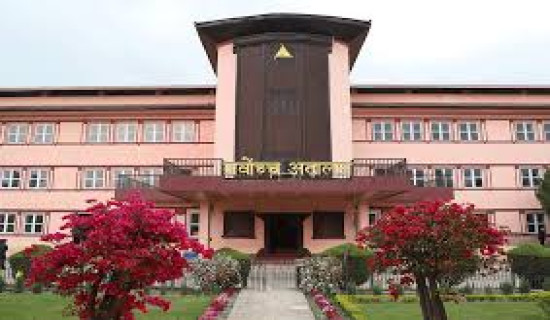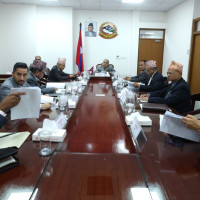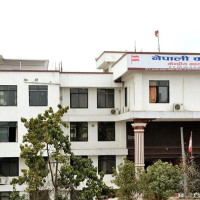- Tuesday, 2 December 2025
Air pollution: A growing concern in Nepal
By A Staff Reporter,Kathmandu, Aug. 29: Air pollution remains a significant threat to human health globally, and Nepal is one of the most affected countries. Based on satellite-derived PM2.5 data, Nepal is the third most polluted country in the world.
Fine particulate air pollution (PM2.5) shortens the average life expectancy of Nepalis by 3.4 years compared to what it would be if the World Health Organisation (WHO) guideline of 5 μg/m³ was met. In some areas, particularly in the southern districts bordering the highly polluted northern plains of India, air pollution cuts lives even shorter—by up to 5.1 years, according to a press statement issued by the Air Quality Life Index (AQLI) on Wednesday.
Nepal faces significant challenges in managing air quality. All 30.7 million people in Nepal live in areas where the annual average particulate pollution level exceeds the WHO guideline. This level of pollution poses a greater risk to health than other factors such as tobacco use, which reduces life expectancy by 1.9 years, and dietary risks and high blood pressure, which cut it by 1.5 years, the statement read.
According to the latest data from the AQLI, the burden of pollution on life expectancy in Nepal is severe. If pollution levels were permanently reduced to meet the WHO’s guidelines, the life expectancy of Nepalis could be lengthened by up to 3.4 years. In the mid and eastern Tarai regions, where nearly 40 per cent of Nepal’s population resides, the residents could gain 4.8 years of life expectancy while those in Kathmandu could gain 2.6 years.
Although there was an 18 per cent reduction in particulate pollution in Nepal in 2022 compared to 2021, this improvement must be sustained to have a long-term impact on public health. If maintained, the reduction could allow the average Nepalis to live 10 months longer than the situation they were exposed to the 2021 pollution levels.
However, looking at longer-term trends, Nepal’s average annual particulate pollution has increased by 49 per cent from 1998 to 2022, which has already lowered life expectancy by 1.3 years, the statement read.
Dr. Michael Greenstone, an expert from the Energy Policy Institute at the University of Chicago (EPIC), stressed that high pollution levels often resulted from weak policy enforcement.
He suggested that countries, including Nepal, should balance their economic, environmental, and health goals by setting and enforcing stricter air quality standards. The lack of comprehensive air quality data in Nepal further complicates efforts to manage pollution effectively. “Without adequate data, setting effective pollution standards and enforcing them becomes challenging,” he said.
Countries like China have demonstrated that air pollution is a solvable problem, having reduced their pollution levels by 41 per cent since 2013. This success shows that with strong policies and enforcement, Nepal could also improve its air quality and public health outcomes, read the statement.
For Nepal, setting ambitious air quality standards is the only first step. Implementing effective policies and monitoring mechanisms to enforce these standards is equally important. By doing so, Nepal can significantly reduce the impact of air pollution on public health and improve the quality of life of its citizens.

















